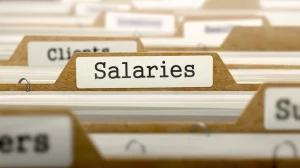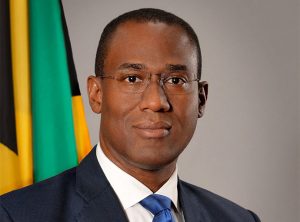

Minister of Finance and the Public Service
The Restructuring of Public Sector Compensation

The international credit rating agency, Moody’s, last week upgraded Jamaica’s credit rating to the highest rating Moody’s has assigned Jamaica in 10 years.
Standard & Poor’s (S&P) also recently upgraded Jamaica to the highest credit rating S&P has ever assigned Jamaica since it started rating Jamaica’s credit 20 years ago. These improvements in the assessment of Jamaica’s economic resilience and future prospects reflect Jamaica’s hard-earned macroeconomic stability.
Macroeconomic stability is necessary for sustainable long-term growth and development, though we know it is not sufficient. It is necessary because it provides the economy flexibility and policy space to absorb and respond to economic shocks without disrupting day-to-day activity. For higher and sustained growth, such stability needs to be accompanied by policies that raise labour and capital productivity, reduce structural impediments to investment, improve human capital, enhance efficiency of the public bureaucracy, and improve governance.
Many may now take this essential pre-requisite of sustained macroeconomic stability for granted. But let me remind that such stability eluded Jamaica for approximately five decades. Today – in no small measure due to the work and sacrifice of the Jamaican people – we concurrently enjoy fiscal sustainability, external sustainability and price stability, that, together with financial stability (about which I will write later), provide the foundation of macroeconomic stability.
To be sure, vulnerabilities remain due to high levels of debt; but the stability achieved is hard-earned and must be fervently safeguarded, even as we work on other reforms.
Budgetary expenditure is typically financed from a variety of sources, including tax and non-tax revenues. However, countries often spend well in excess of their collected revenue. The deficit that arises from the excessive spending is financed with newly borrowed money generating net increases in public debt. The question is whether the stock of debt can be sustainably serviced without eventually crowding out basic public services or critical social and capital expenditure, thereby stifling development. Prolonging such a policy of excessive spending quickly leads to a scenario where the country faces fiscal unsustainability – whereby it borrows to pay interest, and debt uncontrollably spirals upwards, the private sector is crowded out and living standards stagnate.
This has been Jamaica’s history. In 2003-2004, long before there was universal domestic acceptance of the unsustainability of Jamaica’s prior fiscal path, interest costs of $88 billion and salaries of $61 billion alone, (without adding social, programme and capital expenditure) totalled $149 billion in a year when total revenues were only $146 billion. We were effectively borrowing to pay interest. Against that background, it is no surprise that while it took 45 years to incur our first trillion of national debt, in only seven more years the second trillion was accumulated. We put ourselves in an unsustainable debt spiral that only serious and painful reform could reverse.
The fiscal measures to place Jamaica on a sustainable fiscal path have been challenging and required sacrifices by the Jamaican people. Among other measures, it required the consistent maintenance of a very large surplus of revenue over non-interest expenditure. Today, though our debt remains high, we service it from current revenues and we pay down more debt than we borrow each year.
In other words, our fiscal accounts are on a path of sustainability and we must stay the course to reach the Debt-GDP target of 60 per cent by March 2026, as required under our Fiscal Responsibility Law.
Fiscal sustainability as a necessary objective has never been clearer. Less clear, maybe, is why we need external sustainability.
External sustainability refers to Jamaica’s ability to sustainably pay our collective external obligations as they come due, under a variety of benign and adverse scenarios. These external obligations arise, for instance, in households, businesses and the Government – in the form of payments for goods bought abroad, as well as in foreign interest and principal payments. In addition, foreign businesses operating in Jamaica will have obligations to repatriate returns on their Jamaican investments.
Long-term external stability hinges on Jamaica’s ability to meet all our external obligations in times of peace and war, in times of commodity price shocks (for example, a sharp decline in alumina prices or a spike in the price of oil), as well as in good times and bad.
The typical benchmark that reflects external sustainability is the Assessment of Reserve Adequacy (ARA) metric, a quantitative metric developed by the International Monetary Fund (IMF) (and used to measure reserve adequacy for 189 member countries), which captures the level of reserves required to meet external obligations, given the structure and size of the economy.
Today, Jamaica’s foreign currency reserves are in excess of 100 per cent of our ARA metric, (up from 75 per cent in 2016), leaving comfortable room to absorb exogenous shocks.
This has not always been the case. Had Jamaica been externally sustainable in 2016, with an ARA metric in the region of 100 per cent, we may not have needed the IMF Precautionary Stand-By Arrangement. Furthermore, had Jamaica not achieved external sustainability over the years since, we wouldn’t have been able to exit a programme relationship with the IMF in 2019. Our economic independence centres on this critical external sustainability pillar.
The road to external sustainability has required the implementation of various foreign exchange market reforms, inclusive of revamped rules, procedures and practices that have delivered a market-determined exchange rate where forces of demand and supply are resolved daily in two-way exchange rate price movements.
The reforms also included a transparent mechanism for our central bank to interact with authorised dealers in foreign exchange transactions. Prior to these reforms, the information on the price and times at which the central bank intervened in the market were not publicly available. Today, Bank of Jamaica intervention is allocated in a transparent and competitive manner with full public disclosure to all Jamaicans.
For the past four years, Jamaica has enjoyed inflation outcomes of three per cent to five per cent, a distinct departure from the previous two decades when inflation averaged approximately 13 per cent and was highly variable. The relatively constant level of low inflation today, referred to as price stability, is a new experience for Jamaica.
It is easy to forget:
(a) Those days of high inflation and high inflation volatility when high, and extremely high, interest rates choked consumption and investment in a hopeless bid to tame inflation.
(b) The endless rounds of tax increases required for the Government of Jamaica (GOJ) to operate in an unstable macro-economic environment brought on by high inflation.
(c) The unwillingness of most investors to commit beyond the 30- or 90-day money-market instrument due to the uncertainty and risk inherent in a high inflation environment.
(d) How much lower the savings rate was in our high inflation environment.
These days, the central bank’s easing of monetary policy has ushered in the lowest interest rates in Jamaica’s history. The much-reduced interest bill, and faster-than-programmed debt reduction, has allowed the GOJ to implement the first net tax reduction for at least 50 years.
Investors are committing to 10- and 15-year instruments at low rates, expanding and opening new factories and constructing multistorey buildings with optimism, while households are saving at a rate higher than in the past.
These choices and actions of investors and households arise from, and are consistent with, the current environment characterised by price stability. Actions speak louder than words.
Jamaica has not experienced continued fiscal sustainability, external sustainability and price stability, at the same time, for nearly 50 years. We now are. Vulnerabilities remain due to high debt and so it is our duty to preserve, institutionalise and protect our collective achievement of hitherto elusive macroeconomic stability.
We now have the historic prospect of leveraging this economic stability, without compromising it, to build a new Jamaica with economic opportunity for all.
Published in the Gleaner – December 15, 2019
Dr Nigel Clarke is Minister of Finance and the Public Service and Member of Parliament for St Andrew Northwestern. Send feedback to opedjamaica@gmail.com.
The Hon. Nigel Clarke, D.Phil., MP
Minister of Finance and the Public Service
30 National Heroes Circle, Kingston 4
Tel: (876) 932-4656 / 4660 / 4655
Eml: opedjamaica@gmail.com







Finance Minister, Fayval Williams, notes comments in the public domain concerning the appointment of Mr. Dennis Chung as Chief Technical Director (CTD) of the Financial Investigations Division (FID) and a proposal that the Government inserts itself into the process by over-turning the recommendation of the Office of the Services Commission (OSC).

Finance Minister, Fayval Williams, notes comments in the public domain concerning the appointment of Mr. Dennis Chung as Chief Technical Director (CTD) of the Financial Investigations Division (FID) and a proposal that the Government inserts itself into the process by over-turning the recommendation of the Office of the Services Commission (OSC).

The Minister of Finance and the Public Service is pleased to announce the appointment of Mr. Dennis Chung as Chief Technical Director of the Financial Investigations Division (FID), effective June 2, 2025.

A Jamaica Teachers Association Memorandum dated April 23, 2025 to its membership from the Secretary General, Mark Nicely, stated that the Ministry of Finance and the Public Service had outlined that payments for the increments should be made during the first quarter of the 2025-2026 Financial Year.
Stay in the know with everything going on at the Ministry of Finance and the Public Service by subscribing the MOFPS INSIDER magazine.
Stay in the know with everything going on at the Ministry of Finance and the Public Service.